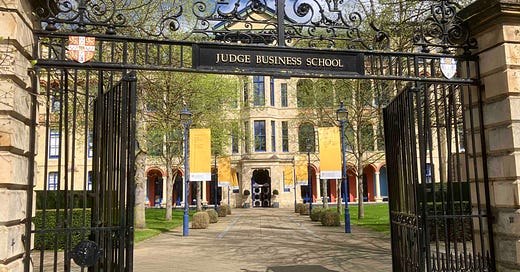I’ve spent $100k on higher education.
7 years at 4 different universities across 3 countries.
Graduated on separate occasions with 3 Master’s degrees.
I also managed to pay off all student loans within only a few years after graduation.
Impressive achievement? Unwise move? A foolish undertaking? You be the judge.
This post is not about how much money I’ve earned, or what the ROI on these degrees might be — I don’t even think that is the right question begin with.
To help you understand this storyline better, I need to take you right back to where it all first started.
I grew up in a small and sleepy town in Sweden, surrounded by countryside and forests. I sailed through the educational system with little effort: preschool, compulsory school and upper secondary school — always looking ahead towards the next educational step. School was easy for me but I was never one of the A-students. I found learning easy and I studied diligently, but deep down I never felt intellectually challenged and I had a slightly rebellious streak which probably went against me.
Getting high grades at this educational level was mostly about memorising information and maintaining good relationship with teachers — sad but true. It was a deeply flawed system. For example, I vividly recall having consistently scored 100% in one of my courses and being told I still wouldn’t get the highest mark, because “The teacher was not allowed to allocate more A’s. They’ve simply run out of them.”
Unfortunately this is not a bad joke — this is what a ‘bell-curve’ and a forced ranking distribution can look like. There was a feeling of resentment towards an educational system that didn’t quite function in the way I needed it to be and I felt slightly out of place and misunderstood.
I started thinking more seriously about my future in the last year at upper secondary school, although I didn’t have very clear plans at this point in my life. Job opportunities in the local area were mostly concentrated in industrial plants, operating heavy machinery, healthcare and retail sales. I couldn’t really see myself going down that path and it didn’t play to my strengths, so I had my gaze fixed on furthering my education instead.
My first taste of higher education was at Chalmers University of Technology in Gothenburg, Sweden. I studied a Foundation Year in Civil Engineering as I wanted to gather additional qualifications in maths, physics, biology, chemistry and engineering which I hadn’t studied before in order to broaden my educational base in the hope that it would expand my choices and academic pathways in the future.
I didn’t take any student loans for this course and I still lived at home with my parents at the time. In hindsight, this arrangement was a very good idea and something I would recommend to others. By not taking on debt and having a support network and essentially a safety net around you is massively helpful. The downside is that I missed out on on socials and extra-curricular activities that being on-site or in close proximity to the university can bring. After one year, I completed the course and bagged a nice diploma but decided that I wanted my studies and career to take another direction in the future.
I reevaluated my options and was accepted into a 4.5 year programme for an International Business Programme with Spanish at Linköping University in Sweden. This probably sounds quite lengthy by UK & US standards, but the good thing about how that degree programme is organised means that students could the programme after 3 years with a Bachelor degree, although they had the option of continuing the full 4.5 year course course upon which a Master of Science degree would be awarded.
This was a really good academic environment to be in. It was very different from what I experienced at upper secondary school and at technical college, which was heavily based on memorising information and teacher-guided sessions. What was different during my business studies is that there was more focus on case-studies, seminars, discussions, problem solving sessions, group projects and last but not least — a lot of independent reading. A typical day would start 8 am in the morning and end at lunch-time. I found this quite difficult actually and rightly or wrongly I thought of it as ‘half-days’ but it basically meant that the rest of the time is designated for independent reading and study. I fully embraced that idea, and I never took a part-time job like many other students did.
I financed this course through government study loans throughout the whole programme, which helped pay for accommodation, food, books and other costs. Fortunately, Sweden is rather unique in that there are were no tuition fees to pay. If you need to pay additional tuition fees on top, the concepts discussed here are still the same, but the stakes are twice as high.

Whilst studying for my first degree, I was awarded a merit-based scholarship to study one year in Valencia, Spain as an exchange student (no tuition fees again) and I also completed additional project-based field work in South America — although the study loans were still needed to cover the same costs as before, including flights and so on. These wider international experiences were brilliant and enriching at a personal level.
Focussing on the positives, what was really great about these experiences were less about the actual technical knowledge that I acquired in finance and business. A less obvious benefit of going through an educational program like this relates to developing soft-skills, for example adapting to different cultures, communication skills and social confidence in new environments. Also, not to mention core hard skills such analytical skills, reading, writing, the ability to structure and synthesise information, learning to learn quickly.
When an employer states that a university degree is required for a particular job, perhaps what they are trying to say is that the expectation is not for you to be able to recite different theorems and factual data, but rather that the job requires an advanced level of the associated skills that I just mentioned which are often developed in an academic environment. Not to say though that university is the only place that such skills can be acquired, but it’s an added benefit of education that is easy to forget about.
If I were to sum up my thoughts on the first university degree, it would be given a big endorsement from me. Going to university is a life-changing experience and it can change your future and transform lives. Perhaps not just for yourself, but for your children as well. It’s certainly not a golden ticket to success and I would describe this experience as crafting a multi-purpose key — then it’s really up to you to go out there and find the right door to open. You are the maker of your own success.
Nevertheless, living on student loans with no other income for such a long time will really start making the debt figures add up. Even though the interest rates were low and quite favourable at the time, I found it a bit stressful to watch the total debt figure creep up every semester and at some point I decided that I would try to “get the most bang for my buck” and I decided to enrol in additional courses that would enable me to graduate with another Master’s degree and I aimed to complete this at an accelerated pace.
My thinking was that if I could graduate with not just one Master’s degree, but two Master’s degrees this would give me an edge over others and make me stand out as a candidate once it was time to apply for jobs. Looking back at this, I think also that my reasoning was influenced by earlier advice I had been given not to take a part-time job during my studies because it would distract me from my studies.
Whilst I agree with this concept to some extent, in hindsight the single biggest mistake I did during my university years was to not do an internship that was related to my course. In other words, I would strongly recommend others to gain work experience in an area related to your degree course — even if it means working for free, as opposed to taking a higher paid-job in an unrelated profession as it will not help you in the same way for your future job search (e.g. if you study Economics - go for an unpaid internship at the local bank branch, rather than a paid job as bartender or similar)
In my case, not possessing this insight myself or having the guidance from a senior person or mentor would in my case add on approximately another 2 years of having to gather additional work experiences after my degree — before I got to the starting point in my career where I really wanted to be.
Anyhow, back to the second Master’s degree — I was now enrolled in a separate Master of Political Sciences programme! It was an exciting time, learning lots and I had two full-time programmes on my plate to juggle. Perhaps this was a mix of overconfidence and naivety to think that the ‘half-day study’ schedules I’ve seen before would add up to a full-day and in theory would be manageable.
I was wrong to say the least. Things started getting tough with heavy coursework to juggle and I started to struggle to keep up. I did manage to get through both courses with overall high grades and the degree certificates did look shiny, but it added a lot of work and unnecessary stress. At one point during my studies I was hospitalised for a few days with stomach pains. Nothing was physically wrong with me in the end — likely just down to the amount of pressure I had placed myself under and things had gone a bit too far and it helped to put things into perspective.
If you haven’t guessed it already, this type of study scheme was anything but a good idea. Having that second Master’s might look good on paper, but I’ve really never had any practical use of it. I think it makes more sense to study one degree and do it really well. If you are looking to gain an edge, instead of piling on more additional coursework, I would suggest to focus on extra-curricular activities instead — entrepreneurship, a specific-interest club, foreign languages or similar.
Fast-forwarding to what happened after graduation — the summarised version is that I was very lucky to land a job in London, UK as a commercial trainee with one of the big retail banks.
My graduate starting salary was quite modest and many of my peers who did not go to university actually earned more than me! Although as the story unfolds, I struck gold by finding a very kind and old landlady who offered to rent out a room with all bills included (council tax, internet, utility bills) for £367 per month within short commuting distance by train into central London. For anyone local to the area who understand these prices, you’ll know this is a complete bargain! Quite possibly, there was an element of philanthropy involved in their rental business and I got the feeling that they understood how tough life can be for newcomers in London, so perhaps they were looking to help people out a bit and also enjoyed the social aspect of having a lodger in their home.
I quickly found myself being able to save as much as 50% of my graduate starting salary. As my career developed and my income grew, my savings/income ratio started climbing quite quickly, whilst I kept my costs largely the same. I started an investment portfolio from scratch and after a few years I had accumulated the same amount in investment assets as my total student debt amount.
At this point, I decided to sell off the assets to clear the entire student debt. Some might say that this is not the smartest financial move (e.g. if you can invest at 10-15% return per year and your debts interest might be 5%, it makes more sense to plough more money into the asset side than paying down debt). However, the sense of freedom and the feel-good factor of being debt-free is totally worth it.
The above approach is something I would highly recommend to others if you are in a position to do so. Live frugally, invest consistently, work hard, keep learning — just keep going and trust the process. It’s important to not let this get to your head though, as you need to live and enjoy your life too.
Moving onto degree number 3: the MBA.
Already before I started my first year at undergrad, I had my eyes set on doing an MBA at some point in my life. I had heard about these MBA degrees which started as a concept born out of US business schools which spread in popularity to the UK and Europe.
I had got my hands on a book from the Economist Intelligence Unit which was called “The World’s Best MBAs”. I kept this book in my bookshelf for many years and decided that it would be one of my life-goals to complete an MBA at a top business school. Looking at the tuition fee levels, this was completely out of reach at this time, so I parked the idea for many years after after I had started working after university.
The idea was always in the back of my head, but I could not see a realistic scenario to start such a degree because it would mean taking on new student debt and ending up with twice the amount of debt that I had already cleared a few years earlier.
An opportunity eventually presented itself through a combination of a generous sponsorship, using my own savings and taking out a career development loan.
To put this into perspective, my MBA from Cambridge University costed around $67,000 about 10 years ago. This is quite a bit of money — and going back to the title of this post, it also suggests that my third and final Master’s degree also made up two-thirds of the overall debt funding of my educational pursuits.
I only have good things to say about the MBA degree. It’s genuinely been the best thing I’ve done academically, I had a fantastic time, met some really great people who will be friends and contacts for life and having the qualification and the brand name on your CV cannot be a bad thing either.
Probably the main thing that I want to call out is regarding the financials. Is it really a good investment? I am leaning towards a yes — but, this is a difficult and complex question to answer.
In my personal case, I have more than doubled my pre-MBA versus my post-MBA income but it’s taken me about a decade to do so (partly because my personal goals and career aspirations have shifted over time). What I think is important to mention here is that people should avoid going into these programmes thinking that doing an MBA will make them more successful and lead to higher income. The people that study for these degrees are already successful — with or without an MBA degree — the latter just enhances their prospects and builds on the success they would likely have achieved anyway.
What you need to understand about the investment in a business education at MBA level is that unlike studies at the undergraduate level, what you’re paying for is not just the knowledge, education and access to the teaching faculty — but increasingly important is that you’re buying into a brand name, access to alumni and networking opportunities and the benefits of a lifelong association to the educational institution.
The course content is actually is actually quite similar between undergraduate and post-graduate studies, although what is very different is the depth and level of discussion in the classroom as the post-grad participants are experienced and mature professionals. I would also call out that there is less emphasis on theory compared to undergraduate studies, and more focus on the practical real-world application of the same.
The distance between academia and industry is also smaller, which is very helpful to find career opportunities and opportunities to get involved in the wider business & university ecosystem. In my case, I benefitted from gaining additional international experience through an international business study trip to China and working on a team consulting project in Azerbaijan. These were regions of the world I had not had prior exposure to before and it was an eye-opening experience for me.
To answer the question of whether this is a good investment is much more complex than trying to put down some financial projects in a 5-year NPV calculation and try to come up with answer. There are a lot of unexpected benefits and twists that can come from being in the right environment, at the right time, with the right people. It’s almost impossible to describe in words or figures what this could be worth in dollars, but what I can say is that the experience is transformational and enriching at a personal level.
I’ll try to summarise everything I’ve covered until now with a few words of wisdom about the return on investment from higher education. Based on my own experience of completing 3 Master’s degrees and spending $100k in the process, my main learnings and take-aways for others to learn from would be:
Going to university [or any form of higher / advanced education] is and always has been a great idea. By improving your skills and knowledge, your earning power will increase and new pathways and options will open up.
I believe the first university degree is the one that will have the most impact. Additional qualifications and degrees are a nice-to-have, more like the cherry on the cake. For this reason, you need to be very clear on the benefits provided and how much you are paying in return.
One degree + one relevant internship is a more attractive combination for employers than anything else. If you have spare time available during your course, I would suggest focus on extra-curricular activities rather than adding on more coursework.
Getting a high ROI from your educational programme means taking into account both the income and the cost element. It’s only the latter that is within your direct control, so where possible try to avoid taking on debt by thinking creatively and be open to different options.
Investing in post-graduate education and advanced degrees is a transformational education journey, but outcomes can vary greatly and it depends mostly on the individual. An MBA will not make you successful, the type of people who seek out such educational experiences already are. It’s their drive and determination that explains the high ROI of such programmes, not the other way around.
Education and knowledge is the lightest load you will ever carry. The real burden comes from the potential debt element to acquire it and you need to carefully weigh the pros and cons of going down this route and how it will apply to your own situation.
Despite what anyone else is might be telling you to do or not do, my best advice would be for you to follow your own path, listen to your own heart and make the choices that are right for YOU.
As a final remark, I also believe there is an element of serendipity in all this. By seeking out the best possible environment and learning opportunities you can find and surrounding yourself with like-minded individuals — good things will start happening, perhaps when you least expect it.





